Admin
My abductors threatened to marry me, took my uniform – Corper
A National Youth Service Corps member, Rofiat Lawal, who was abducted along the Benin-Ore Expressway last Tuesday, has disclosed that her abductors threatened to force her into marriage and take her to Sokoto if her family refused to pay a ransom.
This is just as she narrated that one of the abductors, who are Fulani, took her NYSC uniform and wore it.
PUNCH Metro reports that Rofiat was abducted on her way to her place of primary assignment in Oyo State while coming from Edo State.
The abductors initially demanded a ransom of N20m but after several negotiations, they reduced it to N5m.
A friend of Rofiat, identified as Agbakwara, who raised the alarm about her abduction on his Facebook page, had on Saturday narrated how she was eventually freed after her family paid a ransom of N1.1m to an account purportedly belonging to a family of another kidnapped victim.
Narrating her experience in an exclusive interview with our correspondent on Sunday, Rofiat noted that the kidnappers waylaid the vehicle she boarded along the Ore area of the expressway.
She disclosed that out of the 10 passengers in the vehicle, six of them were kidnapped and led into a bush along the expressway.
She added that valuable items such as money and mobile phones were taken from all the victims, including her NYSC uniform, which one of the kidnappers wore.
The corper said they trekked for seven hours on the first day they were abducted before they were allowed to rest.
She said, “On our way coming from Benin to Ore, they stopped our vehicle. I was sitting at the front and what I heard was gunshots. When I raised my head, I saw three people with guns in front of the vehicle and three people at the back. The driver tried to escape but he could not. So, they asked us to lie down and took six of us.
“They led us into the bush, searched us and collected our phones and money. Some of the victims were marketwomen and they collected all their money, which ranged from N600,000 to N1.2m and so on, but I was with N15,000, which they took from me. One of them took my NYSC uniform and wore it.
“After they collected our valuables, we trekked from 3 pm to 10 pm in the bush. During the day, they would ask us to sit somewhere in the forest and at night, they would ask us to start trekking. That was how we spent the four days with them.”
She narrated that other victims, who were mostly elders and traders, were beaten on several occasions during the four days of captivity.
When asked if she was hurt, she narrated that they did not torture her compared to what was done to others, but one of the kidnappers threatened to force her into marriage and take her to Sokoto State.
“One of them said he would marry me and take me to Sokoto if my family refused to pay ransom. I was less harassed, unlike the other victims who were older than me. I was the youngest among those of us who were kidnapped. They did not even know if I was a corps member or not, they were just concerned about the money they wanted to get from us.
“I don’t know the total ransom that the six of us kidnapped paid as ransom. Some paid N2m, N3m and so on, depending on how your family negotiated.”
Asked if they ate during the four days of captivity, she replied that the kidnappers were prepared with garri, which they gave to them on a few occasions.
“They carried a cooler with them which was stored with garri. That was what they gave us on a few occasions.
“They were prepared for the operation and it does not seem like that was their first time doing it.
She urged the NYSC authority to avail her of some period of rest considering the traumatic experience she had within the four days.
“The NYSC authority has reached out to me. The State Coordinator and my Local Government Inspector have called to check up on me. My appeal is that they should give me some days to rest and get medical attention because of the traumatic experience I had gone through for the four days.
“I do not regret participating in the NYSC because what will happen will happen. Others whom we were kidnapped together were not NYSC members,” she concluded.
She thanked her family for raising the ransom and getting her out of captivity.
[Punch]
[OPINION] Trumpian complexities and Nigeria’s options on the global highway - Owei Lakemfa
President Donald Trump of the United States, US, is driving an articulated truck at high speed on the global highway. His truck has neither a rear view mirror nor side view mirrors. He relies on his assistants like James David Vance and Elon Musk to do the work of the mirrors.
To compound issues, he sees himself as the policeman ordained to maintain world peace and, the judge who dispenses justice.
Therefore, other countries on the highway have to be cautious to avoid a collision, being crushed or run off the road. So, how should Nigeria, the most populated Black nation on earth, navigate the road?
To find answers, the Association of Retired Career Ambassadors of Nigeria, ARCAN, on February 25, 2025 convened an online meeting of international relations practitioners and experts.
ARCAN President, Joe Keshi, said the meeting was necessary because the second coming of Trump has posed challenges not just to Nigeria, but also the entire world.
He reminded the 43 participants that Nigeria, since independence in 1960, has had cordial relations with the US and that the challenge is how to strengthen those relations.
Professor William Alade Fawole, who taught international relations in the Obafemi Awolowo University, Ife for four decades, reached into his very rich intellectual depths to provide a graphic scenario of the situation.
He said we are in a world where we have a mercurial US President who seems to have a few hand grenades which he is tossing about locally and internationally.
He advised that first, Nigeria should focus on its long term goals as the Trump administration will not last forever.
Fawole said the Nigerian government should harken to the advice of former Foreign Affairs Minister, Professor Bolaji Akinyemi, that President Bola Tinubu should be cautious in dealing with Trump.
He said Nigeria has a lot of domestic problems, including electoral challenges, banditry and self-determination “enemy nationals” challenging the survival of the country.
Fawole posited that with this kind of scenario, the country needs to be acareful so that Trump does not throw one of its grenades at it. He equally advised that Nigerian officials should be careful not to make Trump see Nigeria in a bad light. Speaking specifically to President Tinubu, the foreign relations expert advised him to avoid visiting the White House. He urged him to learn from the way French President Emmanuel Macron and Jordanian King Abdullah II were treated when they were guests of Trump.
In my contribution, I argued that President Trump is an unguarded missile and that his attempts to bully Canada, Mexico, Gaza and Panama show that even if a country does not provoke him, he can provoke it. I asked rhetorically, if you avoid Trump but he does not avoid you, what do you do? I suggested that the way out is for Nigeria to mobilise Africa around common needs for collective response, and collective development.
Ambassador Olusegun Akinsanya recalled that Trump had previously called Africa a shit hole and that we should avoid him. He said the American President is busy with his immigration policies, tariffs and exiting international bodies like the WHO and Paris Club, and that if he comes to Africa, we should tell him, like South African President Cyril Ramaphosa did, to keep to his United States and we keep to our Africa.
Ambassador Olabode Adekeye advised that Nigeria should put its house in order, grow its economy and address its security challenges. He also urged that Nigeria supports regional integration and fund inter Africa trade.
Professor Eghosa Osaghae, the Director General of the Nigeria Institute of International Affairs, NIIA, said Nigeria has had an asymmetrical but respectful relationship with the US.
During the Cold War, he said there were things that suggested Nigeria was pro-West but was simultaneously seen as a leader of the Non-Aligned Movement. But that with the ‘Africa has come of Age’ speech at the Organisation of African Union, OAU, Summit in 1976 and our support for the liberation movements in Zimbabwe, Namibia and South Africa, the US began to rethink its position on Nigeria.
Since the 1980s, he noted Nigeria has degenerated to a highly dependent and vulnerable nation.
Osaghae argued that at critical times when Nigeria needed support such as to combat the Boko Haram terrorists, the US was not always forthcoming.
He said when things seem to be unravelling as it is now, they also provide opportunities and, advised Nigeria to invest in ICT and look inwards in order to restore the country’ s greatness. He said with BRICS and other opportunities, if the US is not in a position to offer Nigeria opportunities, it has to look after its own interests.
The Nigeria Charge d’ Affaires in US, Ambassador Samson Itegboje, said both countries have had robust relationship which have been mutually beneficial. These, he explained, bordered on democracy, rule of law, human rights, anti-corruption, good governance, trade and investment and, effective service delivery.
Itegboje said both countries have had discussions about Nigeria’s aspirations for a permanent seat in the United Nations Security Council, and request for weapons like mine-resistance vehicles to fight banditry and terrorism.
Itegboje in reference to the Disengaging Entirely from the United Nations Debacle, DEFUND, Bill sponsored by some US legislators, said he cannot imagine how the UN will look like if the US were to pull out.
He noted that the Trump administration is currently focused on issues like illegal immigration, Gaza and Ukraine and less on Africa. He noted that its main statement on Africa is about the land issue in South Africa, adding that Nigeria needs to look inwards leveraging on AfCTA, ECOWAS and Nigerians in leadership positions in international organisations.
Ambassador Layiwola Lasehinde said Trump does not like BRICS because he thinks it will lead to de-dollarisation. A major problem of Americans, he said, is that once you don’t support their agenda on an issue, they take it personal, forgetting that others also have their own interests.
Ambassador Hadiza Mustapha advised that no matter the challenges Nigeria faces, it should not lose its self-respect. She advised that the country’s reaction on issues should be well informed and well-crafted. The Ambasador added that the country should not allow itself to be downgraded, saying that small countries can get what they want based on good calculations.
Ambassador Keshi by way of a summary, said he liked the idea that Nigeria should stay on its lane and not provoke Trump. He clarified that this does not mean that Nigeria should not engage Trump. He believes that if many young Nigerians are trained in areas like technology, the country can become quite strong in the service sector and economically self-reliant.
I respect Afe Babalola, but my legal battle isn’t over — Farotimi
Human rights activist and lawyer, Dele Farotimi, has said that despite the withdrawal of criminal charges against him, he was still weighing options over his 21-day incarceration and legal battles.
Speaking on The Duke Rants podcast published to YouTube weekend, Farotimi was asked what he would say if he met Chief Afe Babalola today.
He said: “Like a good Yoruba boy, I’ll give him his salutations. It doesn’t change the fact that I’m still considering my options as regards what to do about what I went through.”
Pressed on what options he was considering, he said: “Oh, all the areas of options that are open to a person who was unlawfully kidnapped from his office, hauled before a magistrate for a non-existent crime.”
Farotimi recounted the irregularities surrounding his arrest, stating that law enforcement officials violated standard legal procedures.
“Policemen crossed five state lines, entered a sixth state — from Ekiti to Ondo, to Osun, to Oyo, to Ogun, and then crossed into Lagos. Somebody has to explain the basis of my incarceration for 21 days,” he added.
Recall that earlier in February, Farotimi disclosed that, despite Afe Babalola withdrawing his petition against him, he still faced four separate lawsuits filed by members of Babalola’s law office across different states.
He said: “My inability to speak to certain aspects of this issue is borne out of the fact that, despite the discontinuation of the criminal proceeding, I still have four suits that I am aware of, in four different states of the federation, filed by members of the same law office, against my person.’’
His legal troubles began after Babalola petitioned Ekiti State Commissioner of Police, alleging that Farotimi defamed him in his book, ‘’Nigeria and Its Criminal Justice System.’’
Following his arrest, Farotimi was arraigned before an Ekiti State Magistrate Court for alleged criminal defamation and before the Federal High Court in Ado Ekiti for alleged cyber-bullying.
On January 27, Babalola announced his withdrawal of the cases after interventions by the Ooni of Ife, Oba Adeyeye Ogunwusi, and other traditional rulers.
However, Farotimi’s legal challenges are far from over.
Farotimi strongly defended his book, insisting it was based on research and personal experience, rather than falsehoods.
“I did not sit down in a beer parlour; I was not at an officers’ mess; I was not gossiping. It was not idle, cheap talk. I wrote a book.
“Let us deal with veracity. Anybody can go and read and then come back and challenge me with the lie that I have told,’’ he declared.
He dismissed claims that the controversy was about his personal reputation, adding that the real issue at stake was Nigeria’s legal system.
“This is not a trial of Dele Farotimi. Let nobody make that error. It is a trial of the legal system that we have built as a collective,” he asserted.
Farotimi also emphasised that his book was not intended as a personal attack on Babalola or any individual but was a critique of systemic corruption within the judiciary.
“Chief Afe Babalola is more than old enough to be my father,” he said. “I did not set out to destroy the man or to tarnish his image. Nothing personal. I was writing about the institution of the judiciary.”
[Vanguard]
Dangote to Refund Customers Who Purchase PMS above Advertised Rates from Key Partners
…. Absorbs N16bn loss by refunding N65/litre to marketers for Nigerians to benefit from cheaper fuel
...Insists Nigerians deserve good quality, affordable fuel products
Dangote Petroleum Refinery & Petrochemicals has announced that it will refund customers who purchase Premium Motor Spirit (PMS) at rates higher than the advertised prices from any of its key partners – AP (Ardova Plc), Heyden, or MRS – across Nigeria.
This move follows the refinery's recent reduction of its gantry price from N890 per litre to N825 per litre. The refinery stated that this is part of its ongoing efforts to ensure that Nigerians are the primary beneficiaries of the price reduction and in line with President Bola Tinubu's Renewed Hope Agenda, which aims to stimulate the economy.
In a statement issued over the weekend, the refinery confirmed it will refund N65 per litre on the over 200,000 metric tonnes of PMS purchased by marketers at the old gantry price of N890 per litre, prior to the new rate of N825 per litre. Dangote refinery also absorbed N16bn loss by refunding N65/litre to marketers for Nigerians to benefit from cheaper fuel
“The step, effective February 27, 2025, guarantees that none of our valued business partners will experience a loss due to the price change. More importantly, it ensures that the new, lower rate takes immediate effect nationwide for the benefit of the Nigerian people,” the statement said.
The refinery emphasised that this initiative extends beyond MRS Holdings, Ardova Plc (AP), and Heyden. It urged other marketers sourcing stock from it to pass on the benefits of the new pricing to consumers at the retail level, encouraging a collective commitment to affordable, quality products.
Dangote also condemned any exploitation of the new pricing structure. “It is both unpatriotic and detrimental to the welfare of Nigerians for any party to purchase at a rate of N825 per litre and then sell to consumers at N945 or more per litre. This constitutes excessive profiteering, further burdening Nigerians for personal gain,” the statement added.
"Dangote Refinery in its effort to ensure good quality and affordable fuel for Nigerians, is working with its partners to make this price accessible. Consumers who purchase fuel above the advertised rate at any of its key partners – AP (Ardova Plc), Heyden, or MRS – anywhere in Nigeria, are encouraged to report to Dangote Refinery with their receipts for a full refund of the excess amount.
The approved rates per litre are as follows: MRS: N860 in Lagos, N870 in the South-West, N880 in the North, and N890 in the South-South and South-East; Heyden and AP: N865 in Lagos, N875 in the South-West, N885 in the North, and N895 in the South-South and South-East.
With the new gantry price set at N825 per litre, Dangote Refinery expects that no Nigerian will pay more than N900 per litre for PMS, regardless of location or petrol station. The refinery also underlined its commitment to providing high-quality, eco-friendly fuel that benefits vehicle performance and supports public health.
“Our commitment aligns with the objectives of President Bola Tinubu’s Renewed Hope Agenda, which champions self-sufficiency in critical sectors like energy. We remain dedicated to supporting Nigeria’s economic growth and ensuring every Nigerian has access to affordable, high-quality energy solutions,” the refinery said.
Dangote Refinery concluded, “This initiative is one of many ways Dangote Petroleum Refinery & Petrochemicals continues to contribute to a prosperous and sustainable future for our country. In this journey toward energy security, we stand united with the Nigerian people, always striving to provide lasting solutions and a more prosperous future for all.”
[OPINION] The tangibility of performance - Fredrick Nwabufo
[PHOTO NEWS] Chief Mike Agbedor Abu Ozekhome, SAN, Wins The Sun Courage In Leadership Award
In a star-studded ceremony held at the Eko Hotels & Suites, Victoria Island, on Saturday, 1st March, 2025, The Sun Newspaper honoured High-profile attendees including distinguished Senators, seven Governors, Federal Executive Council members, respected elder statesmen and women, captains of industry, royalty, and academia, all gathered to celebrate 36 remarkable Nigerians who have made significant contributions in various fields. The event, which drew a Who's Who of Nigeria's political, business, and social elite, was a testament to the country's rich talent pool.
The Sun Newspaper on this occasion added another luster to the crown of Akpakpa Vhighi Vhighi of Edoland, Chief (Prof) Mike Agbedor Abu Ozekhome, SAN, as he emerged the winner of THE SUN COURAGE IN LEADERSHIP AWARD. This prestigious award recognizes Chief Ozekhome's outstanding leadership, his unrelenting pursuit of excellence, and his unwavering resolve in the face of challenges.
Chief Ozekhome, SAN, is a renowned lawyer, with a career spanning over three decades. As a Senior Advocate of Nigeria (SAN), he has made significant contributions to the nation's legal landscape.
The ceremony was a night to remember, with a dazzling display of glamour and sophistication. The event was a celebration of Nigeria's best and brightest. As Chief Ozekhome, SAN, took to the stage to accept his award, the audience erupted in applause, acknowledging his remarkable achievements and the impact he has had on the nation.
SEE PHOTO EXCERPTS:
Cryptocurrencies to watch this week: Bitcoin, Pi Network, Hedera Hashgraph
Cryptocurrency prices retreated sharply last week as Bitcoin dropped below $80,000, and the crypto fear and greed index moved to the extreme fear zone.
The main focus among traders this week will be on the upcoming crypto summit at the White House and Friday’s nonfarm payroll data. Some of the top cryptocurrencies to watch this week will be Bitcoin BTC8.92%Bitcoin, Pi Network
![]() PI-14.75%Pi Network, and Hedera Hashgraph
PI-14.75%Pi Network, and Hedera Hashgraph ![]() HBAR6.29%Hedera.
HBAR6.29%Hedera.
Bitcoin
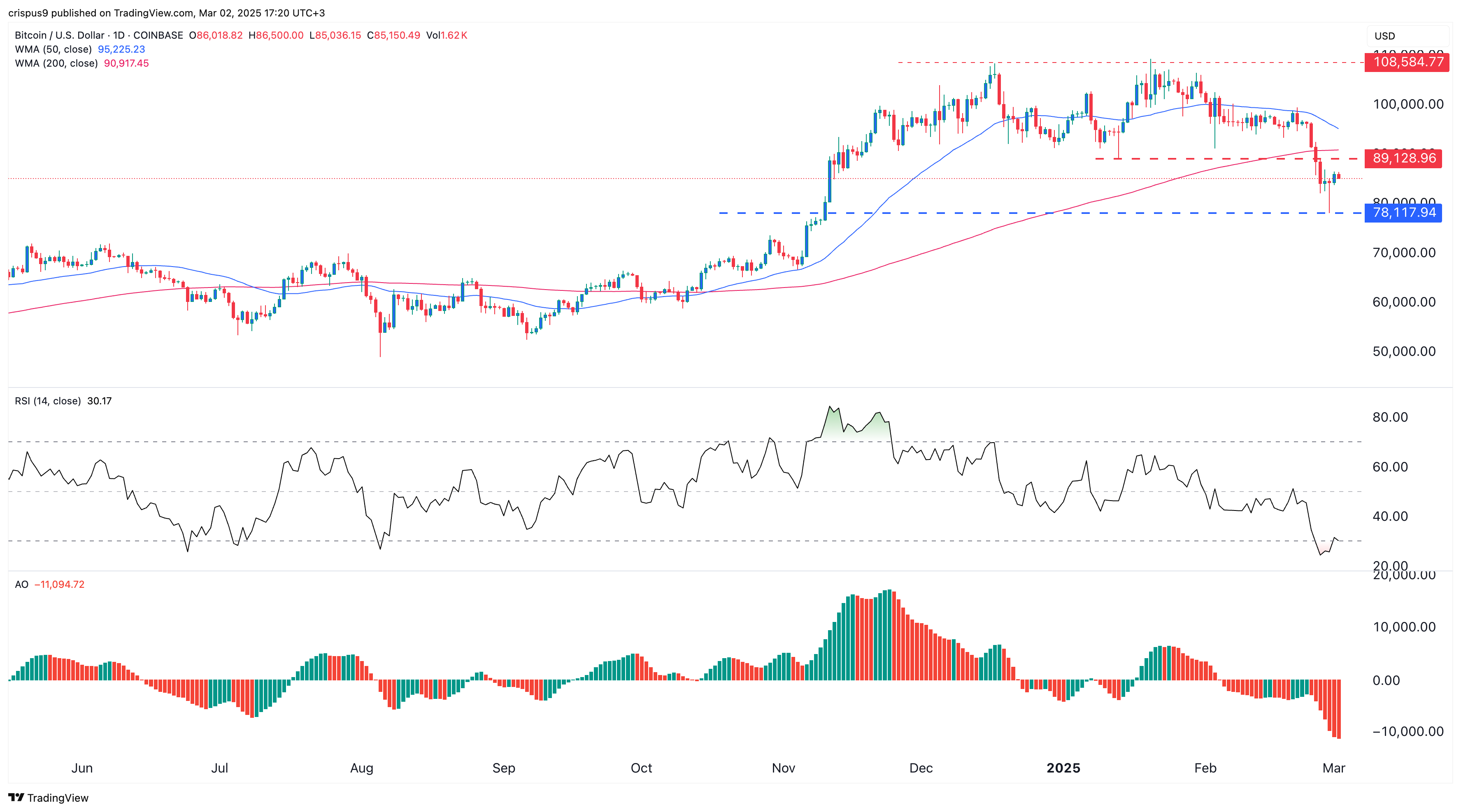
Bitcoin price will be in the spotlight this week because of Friday’s crypto summit. A potential outcome of the event will likely be an announcement on whether the US will launch a Strategic Bitcoin Reserves or SBR.
Bitcoin price retreated to $78,118 last week, and then bounced back to $85,000, where it found substantial resistance. An SBR announcement would be a highly bullish catalyst for the coin.
However, Bitcoin faces some risks ahead. It is attempting to retest the important resistance level at $89,128, the neckline of the double-top pattern at $108,600. Also, the spread between the 50-day and 200-day Weighted Moving Averages has narrowed, risking a death cross formation.
The Awesome Oscillator has moved below the zero line since Feb. 4, while the Relative Strength Index has moved close to the oversold level. Therefore, there is a risk that the BTC price will resume the downward trend this week and retest the support at $78,117.
Pi Network
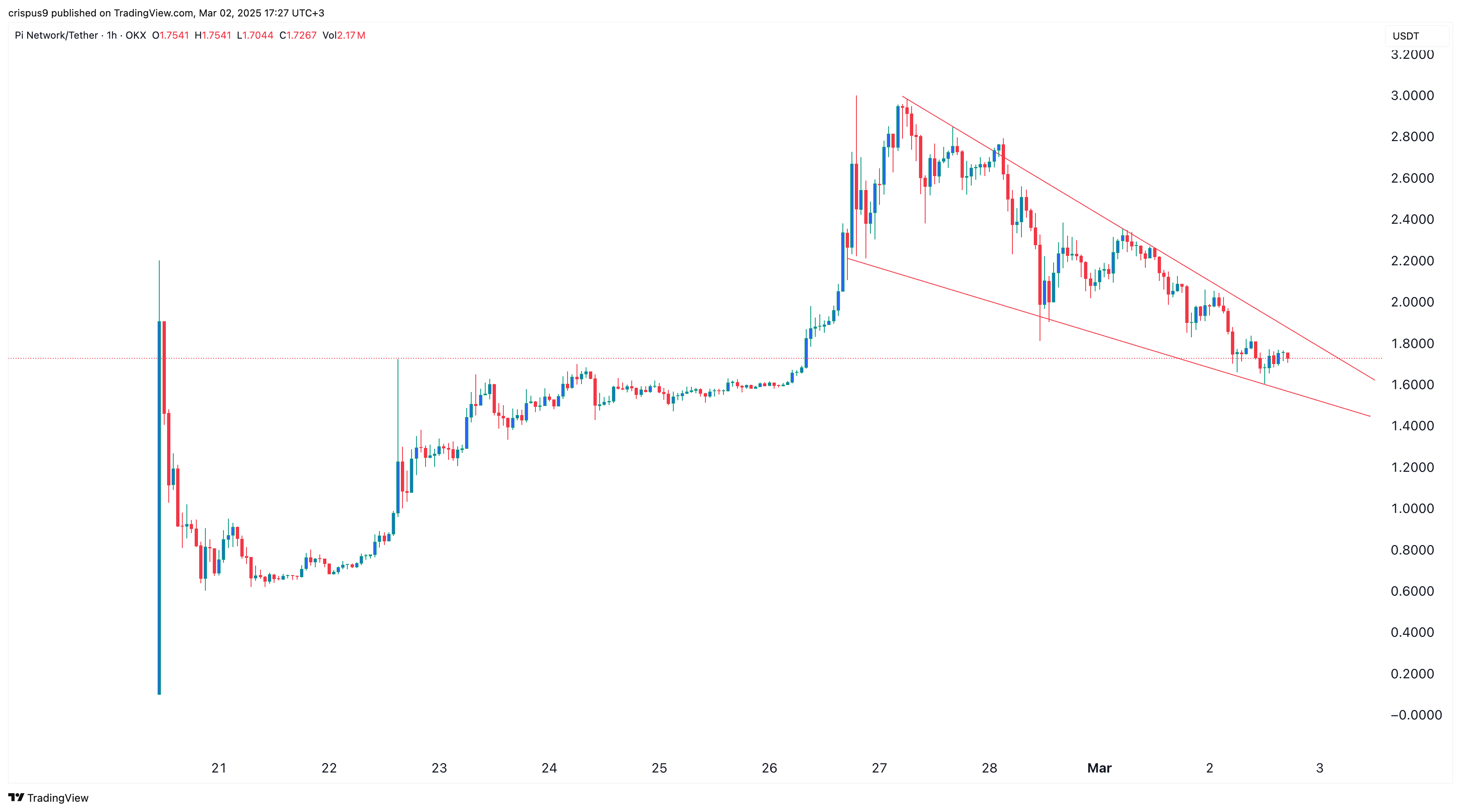
The Pi Network price has had an eventful performance since its mainnet in February. It dropped from $2 to $0.59 and then bounced back even as other cryptocurrencies retreated. It reached a high of $3 as hopes of a Binance listing rose.
Recently, however, the Pi coin price has crashed by over 42% to $1.6 after the developers postponed the KYC grace period again until March 14.
Pi Network price will be in the spotlight this week as Binance potentially lists it, a move that may trigger other tier-1 exchange listings. Hopes that Binance will list it after the conclusion of a poll in which over 85% participants voted in favor of it.
Pi Network price will likely bounce back now that it has formed a falling wedge pattern on the hourly chart. This pattern comprises two descending and converging trendlines, with a breakout happening when the lines near their convergence.
Hedera Hashgraph
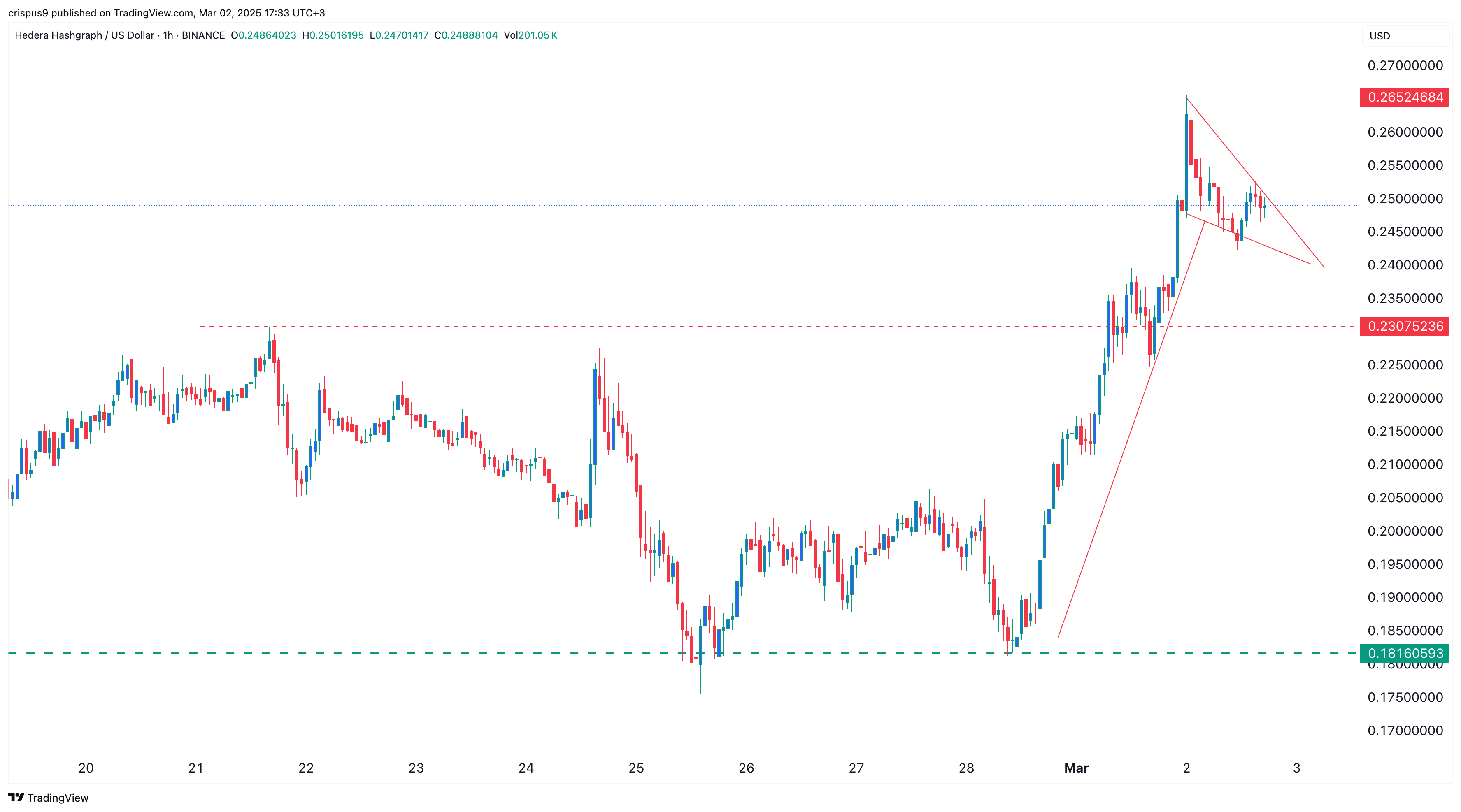
Hedera Hashgraph price jumped last week after inking a partnership with Swift, which handles trillions of dollars annually.
The hourly chart shows that the token surged from $0.1816 on Feb. 28 to a high of $0.2652. It has moved above the key resistance at $0.2308, the highest swing on Feb. 21.
HBAR price has formed a combination of a falling wedge and a bullish pennant patterns. A bullish pennant comprises a tall vertical line and a triangle-like consolidation pattern.
Therefore, Hedera Hashgraph price will likely have a strong bullish breakout, with the next point to watch being the weekend high at $0.2652.
[Crypto News]
XRP flips Tether, becomes third-largest crypto after Bitcoin and Ether
XRP has flipped Tether (USDT) in market cap, reaching $158.86 billion and surpassing USDT’s $142.38 billion valuation, making it the third-largest cryptocurrency after Bitcoin and Ethereum.
The crypto market is on fire, with XRP, Cardano (ADA), and Solana (SOL) soaring in the past 24 hours — a rally fueled by Donald Trump’s post on Truth Social.
The president doubled down on his pro-crypto stance, announcing plans for a U.S. Crypto Reserve that would include XRP, SOL, and ADA, Bitcoin and Ether.
“A U.S. Crypto Reserve will elevate this critical industry after years of corrupt attacks by the Biden Administration, which is why my Executive Order on Digital Assets directed the Presidential Working Group to move forward on a Crypto Strategic Reserve that includes XRP, SOL, and ADA,” Trump posted on Truth Social, adding that he will make “sure the U.S. is the Crypto Capital of the World.”
Following Trump’s statement, XRP surged 26.1%, ADA skyrocketed 49.7%, and SOL gained 18.1%. Investors are speculating that Trump’s endorsement of specific altcoins could bring increased institutional and government adoption.
Bitcoin (BTC) and Ethereum (ETH) also saw gains, with BTC rising 3.8% to $87,894 and ETH climbing 2.9% to $2,237.
Short traders wiped out as market spikes
With prices surging, short sellers betting against the market were hit hard. In the past 24 hours, 93,415 traders were liquidated, bringing total liquidations to $356.36 million, according to CoinGlass. The largest single liquidation order occurred on HTX’s BTC-USDT pair, totaling $39.86 million.
Of the $357.7 million in liquidations, $248.67 million (69.52%) were shorts, meaning traders betting on lower prices were burned as crypto prices soared.
One whale, who was long on BTC and ETH with 50x leverage, has closed most of his positions, pocketing over $6.8 million in just one day, according to on-chain analytics firm Lookonchain.
[TheStreet]
Defection to APC: Labour Party accuses Valentine Ozigbo of betrayal
The Labour Party (LP) has accused Valentine Ozigbo, the 2021 Governorship candidate of the Peoples Democratic Party (PDP), whom it described as “a nominal member of the LP,” of betrayal and making a serious attempt to demarket the LP.
Obiora Ifoh, the LP’s National Publicity Secretary, said this in a statement in Abuja on Sunday.
According to him, the attention of the LP’s leadership was drawn to interviews granted to some national televisions by Mr. Ozigbo, “Though until recently a nominal member of the Labour Party but a familiar face in the Peter Obi Campaign Council wherein he made serious attempts to demarket our party in his attention seeking antics.”
Ifoh said, “As a party, we rarely respond to media attacks by individuals who, for political reasons, create some aura of importance around their persons but, in actual fact, are liabilities to both the party they belong to and also to their constituents.
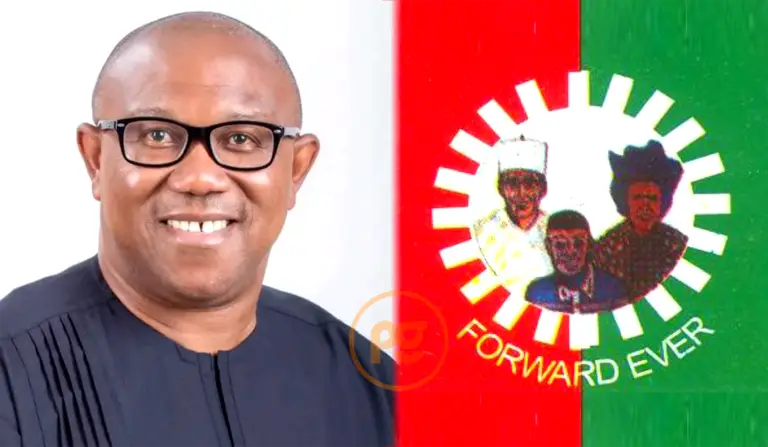
“But for Val Ozigbo, the Labour Party views his present pitiable position as quite unfortunate and can only advise him that no one gets into a position of power through betrayal and desperation.
“It is a fact that Val Ozigbo contested the Anambra governorship election in 2021 under PDP and woefully lost to an APGA candidate.
“In that election, he sought and got huge support, both financial and moral, from many Nigerians, many of whom he has now shamelessly denied.
“When he joined the Labour Party after the emergence of our presidential candidate in 2022, his mission was very clear: to work for the candidate.
“He tagged along the campaign without adding any value whatsoever to the campaign, hoping to earn some popularity with his closeness to the candidate.
“Today, Ozigbo has shown his real character, and he is even claiming that his association with the Obidient family was a disservice to his political ambition.”
The LP Spokesman further said, “Let me at this point reveal real reasons why Val Ozigbo left the Labour Party.
“Though he cited the party’s national convention and defections, however, it is a known fact that the issue of the national convention held in Nnewi, Anambra state, has been clearly and decidedly addressed by the courts in favour of the incumbent executive.
“Also, the defection is a national malaise affecting all the major political parties, and these defections are being challenged in the courts.

“The truth is that Val Ozigbo would rather contest the election in a political party where he hopes to be rewarded by the government in power when he loses the election.
“It is a fact that he has been financially challenged after the 2021 election, and he is desperately in need of resuscitating himself.
“It is obvious that Mr Ozigbo has neither the interest of the nation nor Anambra State as he claimed; rather, his interest is clearly pecuniary.
“Unfortunately for him, virtually every political party in Nigeria knows his trajectory in politics and his character of joining a political party a few months before the governorship election, buying the candidacy, blocking other more focused aspirants, wasting the slot and dumping the party without qualms.
“We advise Mr Ozigbo that the parties have since learnt that they can never be used again as Special Purpose Vehicles by desperate politicians whose only interest is to seek personal glory and dump them at the end of the day.
“In the case of the Labour Party, he had thought that his fake fraternity with the Presidential candidate would earn him the candidacy unopposed, but he was disappointed by the leadership of the party in his ward and state who confronted him with the facts of his non-support of the party.
“Val Ozigbo, in his entire membership of the Labour Party, never supported the party even in his polling unit.
“Every politics is local, but to him, endorsement from the top is all that matters. It will interest you to know that in the 2023 presidential election, the Labour Party lost the election in the polling unit in front of Ozigbo’s residence.
“It tells you how weightless Ozigbo is politically. I doubt if any serious political party will toy with his candidacy in the coming Anambra governorship election.
“The party, of course, reminded him very clearly during the July 2024 Anambra State Congress, where all his nominees were flatly rejected in a free and fair contest.
“The very embarrassed Val Ozigbo read the handwriting on the wall, and that pushed him to rebel against the party leadership. Unknown to many, Mr. Ozigbo actually left LP in July 2024 after that disgraceful outing.
“Obviously aware that he has been ostracized politically, he quickly joined in stoking the crisis in the party leadership, which he is now citing as one of the reasons he left the Labour Party.
“We want also to advise him that being a destructive agent against a party that once offered him a platform to achieve his political aspirations can be cruel and hardly a way to go in politics, the consequence of which can be disastrous.
“His adversarial critique of the party is not just infantile but has also gone further in diminishing his already frustrated personality.
“Politics is all about competition; you cannot attain any position in the struggle for power if you are afraid to compete. Probably, the quality of aspirants in the Labour Party in the Anambra state governorship race and low confidence in himself may be another reason why he took the sudden flight from the party, but we still wish him well in his future political engagements.”
[OPINION] The Eternal Queue: Nigeria’s National Pastime And Predicament - Prince Charles Dickson
Fuel Station Palaver
Setting: A scorching afternoon at a seemingly endless fuel queue in Lagos. Mama Ade and Papa Emeka are neighbors, stuck in their cars, inching forward.
Mama Ade: Papa Emeka! Na you be dis? Ah, dis fuel wahala go kill us one day! See queue, e be like snake wey swallow elephant!
Papa Emeka: Mama Ade! Wetin man go do? Motor don dey nearly drink air. Dem say fuel dey, but e be like say na for oyinbo land dem keep am. Laughs dryly Na only for Naija you go queue to buy wetin you get money for!
Mama Ade: True, true! Even for heaven sef, I sure say queue go dey for gate if dem share free gold. Na our national sport be dis, queuing Olympics! But eh, my back dey break o. Dis good governance wey dem promise, na queue dem mean? Queue for fuel, queue for light, queue for water… Na queue upon queue!
Papa Emeka: Sighs Na so we see am o. Dem say we dey resilient. But I dey think, na resilience or na we just learn to dey suffer and smile? Maybe one day, queue go queue for us, e go tire, e go commot for road. But until dat day, make we dey manage, dey pray, and dey sweat for dis line!
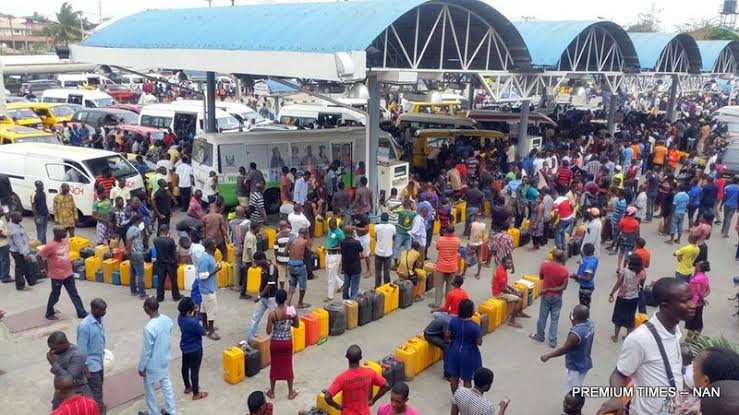
Bank Wahala
Setting: Inside a crowded bank hall in Abuja. Young Corper Tunde and Elder Musa are waiting in the snaking queue for the teller.
Tunde: Baba, good morning… or good afternoon sef. Dis bank queue dey fear me! E be like say to collect your own money for Naija, na pilgrimage.
Elder Musa: Fans himself with a newspaper My son, welcome to Nigeria! Na since we bin small pikin we dey queue. For school fees, for food, now for pension… Queue na our heritage! Chuckles sadly Dem say technology dey make life easy, but ATM queue sef dey longer pass NEPA queue before!
Tunde: But Baba, all dis plenty queue, e no tire us? Dem dey promise us change, better Naija… but na same queue we dey see. Good roads, hospitals wey dey work, light wey no dey blink like Christmas… Na queue we still dey for all of dem.
Elder Musa: My son, e get wetin eye see, mouth no fit talk. Maybe di queue na test from Baba God. To test our patience, our faith… or maybe to test if we go finally vex and use our leg break di queue! But for now, we dey here, dey queue, dey hope say one day, we go reach front, collect our right, and maybe, just maybe, see small change for di better Naija we dey dream of.
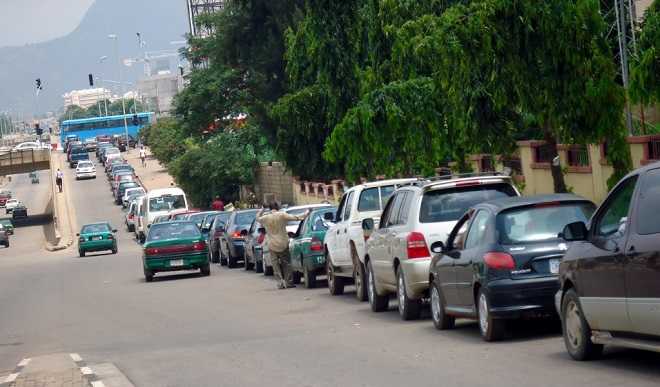
Fuel crisis queue
Ah, the queue. That ubiquitous, serpentine entity that slithers through the Nigerian landscape, a constant companion in our daily lives. From the hallowed halls of A-class events to the humble confines of Iya Basira’s Amala joint, the queue reigns supreme. It’s a national pastime, a social ritual, and, let’s be honest, a profound national predicament.
Consider the A-class event, a spectacle of champagne flutes and canapés. One might expect a certain level of decorum, perhaps even a touch of regal efficiency. But no. The buffet line, that sacred trough of culinary delights, becomes a battleground. Dignitaries, celebrities, and the crème de la crème of society, all reduced to shuffling mortals, plates in hand, eyes fixed on the jollof rice like pilgrims at a holy site. It’s a humbling experience, a reminder that in the face of free food, we are all equal.
Then there’s the fuel scarcity, a recurring national drama that plays out with the predictability of a Nollywood plot. The headlines scream, “Fuel Scarcity Looms!” and, like Pavlovian dogs, we react. We abandon our homes, our offices, our very sanity, to join the snaking lines at petrol stations. Cars stretch for miles, forming impromptu parking lots, and tempers fray like overstretched elastic bands. It’s a national exercise in patience, or perhaps, a national exercise in masochism.
The banks, those bastions of financial probity, are no different. The ATM, a marvel of modern technology, becomes a monument to our collective frustration. We stand, we shuffle, we sigh, watching as the minutes tick by, each transaction a Herculean effort. And heaven forbid you need to see a teller; that’s a queue within a queue, a bureaucratic labyrinth designed to test the limits of human endurance.
Iya Basira’s Amala joint, a culinary institution, is a microcosm of the national experience. The queue here is a testament to the irresistible allure of her pounded yam and egusi. It’s a vibrant, noisy, and slightly chaotic affair, where conversations flow as freely as the palm wine. But even here, in this haven of culinary bliss, the queue is an ever-present reality.
And let’s not forget the senior citizens, those who have toiled and contributed to the nation, now forced to endure the indignity of queuing for their pensions. It’s a national disgrace, a testament to the bureaucratic ineptitude that plagues our institutions. Surely, a thunder 5.0, delivered with the righteous fury of a vengeful deity, is the only fitting punishment for such callous disregard.
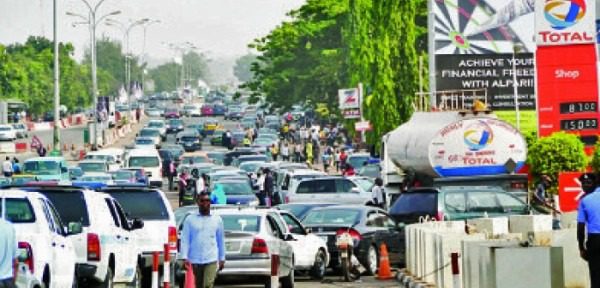
Fuel Scarcity
The cinemas, the places of worship, the airports, the immigration offices, the passport offices, the exam halls – all are united by the common thread of the queue. It’s a social equalizer, a national leveller, reminding us that no matter our status, our wealth, or our influence, we are all subject to the whims of the queue.
Even our roads are not immune. The infamous “go-slow,” a queue of cars stretching for miles, is a daily ordeal, a test of patience and a testament to our collective acceptance of gridlock as a way of life. It’s a symphony of honking horns and frustrated sighs, a mobile queue that moves at a snail’s pace.
One might argue that the queue is a symbol of our resilience, our ability to endure hardship with a stoic shrug and a wry smile. But is it really resilience, or is it a learned helplessness, a passive acceptance of inefficiency? Are we so accustomed to queuing that we’ve forgotten what it’s like to live in a system that functions efficiently?
Perhaps the queue is a reflection of our national character, a testament to our communal spirit. We queue together, we suffer together, we complain together. It’s a shared experience, a collective ordeal that binds us together. But is it a bond we should celebrate, or a symptom of a deeper malaise?
The queue, in all its forms, is a mirror to our society, reflecting our strengths and our weaknesses. It’s a reminder that we are a nation of patient people, but also a nation plagued by inefficiency. It’s a testament to our communal spirit, but also a symbol of our collective acceptance of mediocrity.
We must ask ourselves: are we destined to forever shuffle in these endless lines, or can we break free from the shackles of the queue? Can we create a system where efficiency reigns, where queues are the exception rather than the rule? Can we build a nation where the “go-slow” is a relic of the past, and the only queues we encounter are those at the gates of paradise?
Until then, we will continue to queue, to shuffle, to sigh, and to laugh at the absurdity of it all. For in Nigeria, the queue is not just a line; it’s a way of life. And perhaps, just perhaps, it’s a story we tell ourselves, a shared narrative that binds us together, even as it tests the very limits of our patience, the question is how long do we have to stay in the queue waiting for the good of governance, the best of leadership at the very local level, when will the queues for better education, accessible healthcare be a right to every Nigerian—Only time will tell.
—


![[OPINION] Trumpian complexities and Nigeria’s options on the global highway - Owei Lakemfa](/media/k2/items/cache/83d1323f231b51d0f1e9da7ba39c2e26_Generic.jpg)


![[OPINION] The tangibility of performance - Fredrick Nwabufo](/media/k2/items/cache/b43ee0621519fdd110f29affc634a075_Generic.jpg)
![[PHOTO NEWS] Chief Mike Agbedor Abu Ozekhome, SAN, Wins The Sun Courage In Leadership Award](/media/k2/items/cache/411c97da88ebc19b17ae20df1344cd8e_Generic.jpg?t=20250303_054907)



![[OPINION] The Eternal Queue: Nigeria’s National Pastime And Predicament - Prince Charles Dickson](/media/k2/items/cache/9a95200a817021eec5472664a542cdbd_Generic.jpg)